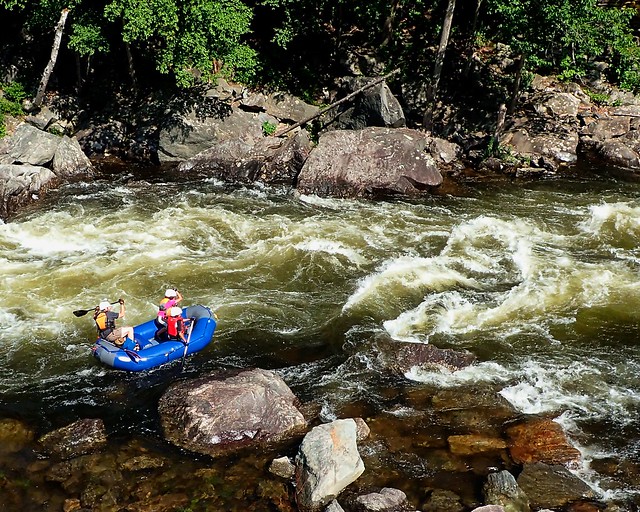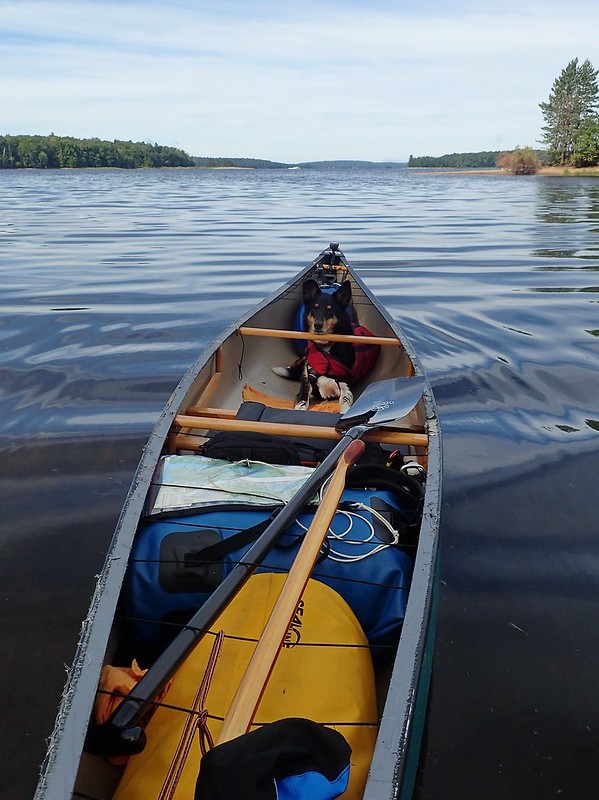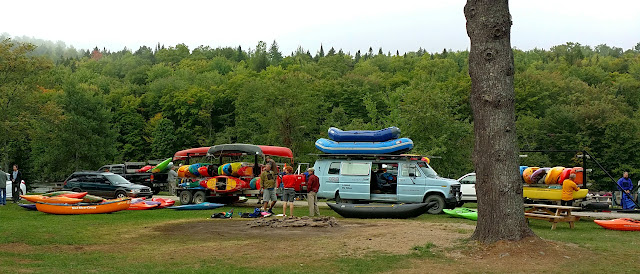 |
| Setting up for the shuttle Saturday morning. Our tiny Nine.Five is the raft on top of the 13ft raft on top of the van. |
Ever wonder what tossing your cat in a top loading washing machine would feel like? ---NOTE: I'm being facetious, I would never put my cat -and probably not your cat- in a washing machine, but this is the internet and some idiot will be offended that I used literary license to set the stage for the rest of the blog.---
Last weekend we ran the Dead River at 3500cfs (technically about 3550 with the Spencer Stream inflow). It was arguably our hardest river run to date. Slightly more technical than the Indian River (Hudson River Gorge, Indian Lake, NY), much longer, and the waves were at times much higher. Though, I never found it as fast as the Indian. Like the Indian, the Dead is not particularly technical, perhaps just a handful or must do moves over 16 miles. It was definitely a fun and challenging run for us in our first full year of whitewater. And probably about the max I'd feel comfortable with paddling without the safety net of partners in other boats.
The Dead River in The Forks, Maine is perhaps the Northeast most sustained whitewater run with a class IV-V rating at flows above 5500. At those flows there is also one nasty keeper hydraulic, which has been responsible for at least two deaths and a few guides losing their jobs. Fortunately, at 3500 it's just starting to form and not really too much of an issue. Unfortunately, it's sort of at the end of a bunch of rapids (well, a bunch of harder rapids, because the Dead is 16 miles of almost non stop rapids). So, it's very easy to let your guard down. In fact, this happens quite a bit. People think they passed it. And I did too.
When most people think of whitewater, they think of bombing down a
river like a chicken without a head. But, it's really a highly skilled
game with lots of nuances and ever changing conditions. Learning to read
a river and adjusting to the different currents, cross currents and
features, and applying the correct strokes, angles, edge and maneuvers is really quite
exhilarating. It's a chess match. My goal is to become a competent R2
rafter up to class V and a competent OC boater at least to class 3+. To
do that requires a lot more than just bombing down the river and hoping
for the best. So while practicing technique on our home rivers, we've also been trying to run as many new rivers as possible.
Our original plan for Evil Nasty Hole was to run right of river center and deal with the other hole on that section of river, FBI hole -also a strong hydraulic, but one that is borderline fun at almost all levels once formed. By staying river center to right of center down the "boiling wave train" we'd be clear of Evil Nasty and perhaps skirt FBI on the left. For some reason I assumed with passed the aptly named keeper hole, Evil Nasty (also called Unemployment Hole), and we were sort of going down the left side of the river in a relaxed fashion.
Lots of waves indicate a wave train which is generally not formed by rocks, but rather a slow down of the water in front of you, perhaps a pool or change in gradient or difference in width of the river. Waves are only an issue if two or fewer waves are seen in a row because one or two can be formed by a rock or other obstruction. As we got closer I noticed the big wave in front and called out lets head left, which was the river edge closest to us. Then at the last minute we decided to go right, which was the original plan. Still not 100% aware that this was definitely Evil Nasty. Within seconds we were sure it was, based on the cliffs down river left, and the big wave to our left. We tried paddling hard right using a combination of draws and forward strokes. In hindsight, back ferrying would have been our best option, but alas, this is where first year whitewater paddlers get into trouble. Instinctively we should have back paddled into a back ferry towards river right, using the force of the current to move us right while not getting significantly closer to the hole and most likely missing the hole. We ended up just catching the right edge of Evil Nasty because we tried to paddle down river cross current. Doh! Rookie mistake.
What lulled me (and really us) to sleep was the river description was for the 5500 flow level. The river to the center simply didn't have that big nasty looking wave train, in fact, the commercial rafts love wave trains because they look nasty and are fun with big splashes, but usually aren't the slightest bit technical, and they all went river left (one going into Evil Nasty after we left) since the wave trains simply weren't there.
I'd say being caught in Evil Nasty at 3500 for two minutes was a fun
experience, but it also was the first keeper hole we have been in, and
as such, I learned just how nasty such a hole can be. If you aren't failing your probably aren't pushing yourself, and you probably aren't going to progress. Getting caught in the hole while not planned and technically a failure on our part for several reasons, definitely was a learning experience.
I do hope to go back to the Dead for a two day release at 2400cfs (Class II+) and run it with our hardshell OC2, and also do it again at 3500cfs (Class III+) with our Aire Nine.Five raft. I'd also like to be good enough in the raft to run it R2 at 5500 (Class IV) next year by the end of the year. Not to mention I'd like to give the Kennebeck (Class IV) a run as well. Hopefully by that point we have another 30 river days under our belts, perhaps a swift water rescue course and maybe some paddling partners to give us a little more safety margin.
 |
| Our campsite at River Drivers |
After Evil Nasty you have the hardest part of the river in front of you, Little and Big Poplar Falls. Two solid class 3 sections with big waves and some maneuvers to line them up. Those went perfectly and we ran good lines. We took out almost directly at our campsite (200ft portage to our campsite) at Webbs/River Drivers campground, a small low key family operation. River Drivers no longer guides rafts or has a restaurant on site, but it's the sort of unpretentious, low key, no frills sort of place I like to stay. If you need more fancy digs, Northern seemed like a swanky place to stay (hot tub, pool, onsite restaurant, etc) and other rafting outfits also provide camping. Downsides of River Drivers, there is a logging operation
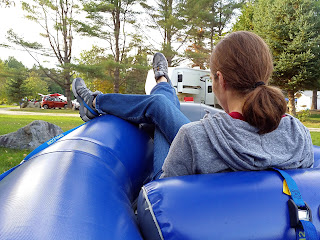 |
| Best part of owning a raft, it doubles as camp furniture! |
on site and because they are dog friendly (which is awesome) there is also the potential to step in dog poop (mostly from their 3 big, friendly, and well behaved labs). Like all rafting campgrounds, quiet hours are whenever till two ours before shuttle time, so don't count on sleeping too much, but this isn't a River Driver issue, you'll find it anywhere. They also offer a shuttle most weekends the Dead runs, and it's I believe $10 a person, $5 per boat and a $5 surcharge for the raft (don't use that as a basis for budgeting, I know it was $30 for two of us and a raft, the raft was extra). It was a friendly operation which I'll definitely use again, and I hope they continue to offer camping and shuttle service.
The rest of the trip was awesome filled with generally great weather, and included a stop in Portland, Maine, where we were compelled to indulge in some fresh Maine lobster.
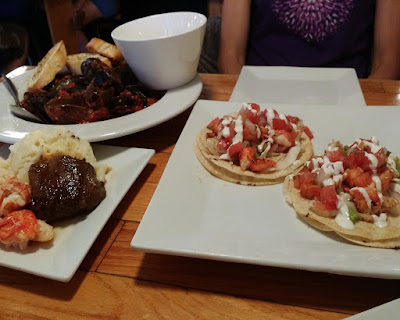 |
| Andy's Pub in Portland. Lobster tacos, tenderloin and lobster and mussels marinara. The lobster tacos were incredible. |
|
|
Evil Nasty Hole - Dead River, Maine from
Mountain Visions on
Vimeo.
Ever wonder what it would be like to put your cat (or yourself, for the cat lovers out there) in a top loading washing machine? There is really only one keeper hydraulic on the Dead River, it's aptly named Evil Nasty Hole, and this is it. At 3500cfs it's pretty tame, only keeping us for a little under 2 minutes and not really being a drowning machine that can form at 5000cfs.. The record, if you care, is 10 minutes in Evil Nasty, we barely even get a participation ribbon. The Dead is 13 miles of essentially non stop rapids, so I sort of let my guard down when we got to this point.. I did tell my partner I thought we should head left, but we then decided to move river center (as originally planned) and skirt it on the right. As you can see, we didn't quite get out of it's re-circulation.. Next time we go left (or way right).












